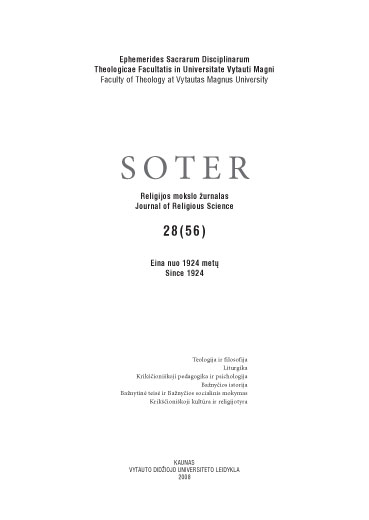Sistema ir dvasia: žmogiškos tvarkos kalėjimas ir išlaisvinanti Dievo malonė
THE SYSTEM AND SPIRIT: THE PRISON OF HUMAN ORDER AND LIBERATING DIVINE GRACE
Author(s): Rolandas BartkusSubject(s): Christian Theology and Religion
Published by: Vytauto Didžiojo Universitetas
Keywords: sistema; dvasia; įstatymas; laisvė; Šventoji Dvasia; malonė; system; spirit; law; freedom; Holy Spirit; divine grace.
Summary/Abstract: The tradition of western mind is restricted by artificiality, insularity, dogmatism, inertia and other features of the system while systematically developing ontological, gnoseological, ethical and aesthetical reflections. Such thinking constructions claim to regularly complete reality view (vision of reality) and ensure the feeling of comfortable and framed being. The system is a rational mode of cognition and action regularly structuring recurrent elements in the phenomenon’s flow. On the other hand, it is an order of finite and weak human being submitting to its own inertia and increasingly constructing perverted picture of the world and virtual reality. We constantly fall into a trap of rational actions program: after having a short joy of seeming control we feel the system emaciating us by its sophisticated structures. Only an intellectually free human being is able to find his/her carnality and mentality and realize that despite of his/her being in a coherent unity with psychosomatic system, he/she is able to reflect that system in distraction. Being in transcendental attitude, we see and discern sensual attitude, however the latter does not see the transcendental one. On the lower level we find some hints of the higher one. It happens when the rules of the lower level do not explain certain manifestations of the higher one which does not comply with the logics of the first level. If a human being lived only according to his instincts, his behavior could be forecasted as the actions of a computer or a particular animal. Inscription of a moral law within our hearts explains why a man chooses not the comfort or safety, but rather responsibility, sacrifice, difficult but meaningful way. Sometimes human actions do not comply with the computer logics or the laws of nature, and that is where sublimity of man manifests itself; this is the essential difference between man and nature. Of course, although the system organization operates differently in instincts, thinking, mechanics and morality, still there is a system. A habit may be both instinctive and moral; the value of the first one can be verified by the second, but by what means can the second be verified? After all, the moral law indicates only the general attitudes that demand subtle constant vigilance in changing situations both in my inside and my surroundings. Can I somehow prepare for them in advance? Different trainings (including spiritual ones) develop attitudes and capabilities, but I cannot know which one I will need next year or next minute. Within the frame of a system we can hardly be surprised. Neither I myself, nor my well-structured environment cannot surprise me by anything essentially new; the man of a system actually does not want his world to be invaded by something unexpected, unsafe. The other man, all the otherness, even divine reality is artificially transformed into my ownness, even into miness. So the idols - demonic images of God - are created. Then the authent
Journal: SOTER: religijos mokslo žurnalas
- Issue Year: 56/2009
- Issue No: 28
- Page Range: 7-22
- Page Count: 16
- Language: Lithuanian

